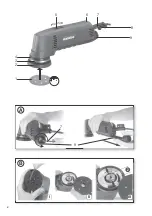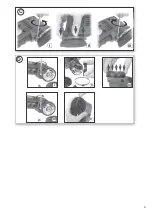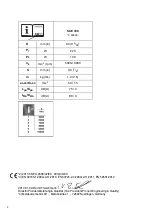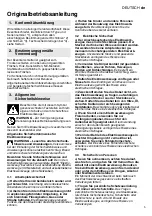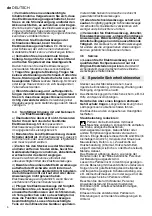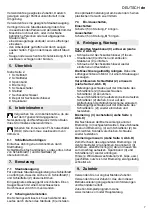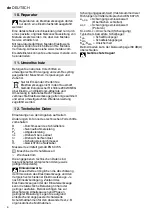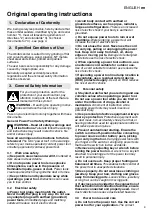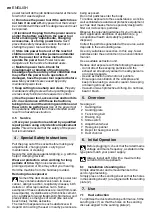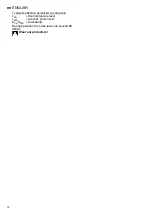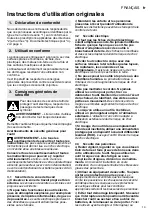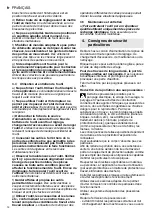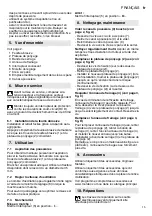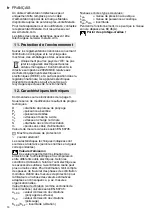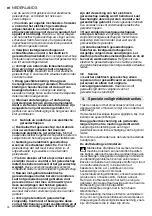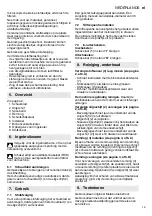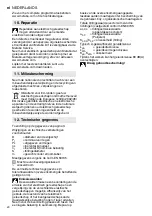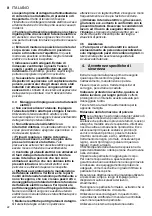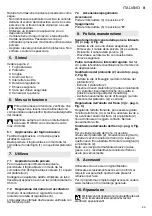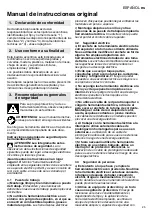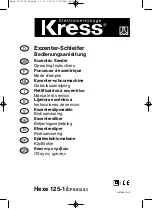
ENGLISH
en
10
power tool will do the job better and safer at the rate
for which it was designed.
b)
Do not use the power tool if the switch does
not turn it on and off.
Any power tool that cannot
be controlled with the switch is dangerous and must
be repaired.
c)
Disconnect the plug from the power source
and/or the battery pack from the power tool
before making any adjustments, changing
accessories, or storing power tools.
Such
preventive safety measures reduce the risk of
starting the power tool accidentally.
d)
Store idle power tools out of the reach of
children and do not allow persons unfamiliar
with the power tool or these instructions to
operate the power tool.
Power tools are
dangerous in the hands of untrained users.
e)
Maintain power tools. Check for
misalignment or binding of moving parts,
breakage of parts and any other condition that
may affect the power tool's operation. If
damaged, have the power tool repaired before
use.
Many accidents are caused by poorly
maintained power tools.
f)
Keep cutting tools sharp and clean.
Properly
maintained cutting tools with sharp cutting edges
are less likely to bind and are easier to control.
g)
Use the power tool, accessories and tool bits
etc. in accordance with these instructions,
taking into account the working conditions and
the work to be performed.
Use of the power tool
for operations different from those intended could
result in a hazardous situation.
3.5 Service
a)
Have your power tool serviced by a qualified
repair person using only identical replacement
parts.
This will ensure that the safety of the power
tool is maintained.
Pull the plug out of the socket before making any
adjustments, changing tools, carrying out
maintenance or cleaning.
Secure the workpiece against slipping, e.g. with the
help of clamping devices.
Wear ear protectors when working for long
periods of time.
High noise levels over a
prolonged period of time may affect your hearing.
Hold the machine from the handles provided.
Reducing dust exposure:
Some of the dust created using this power tool
may contain substances known to cause
cancer, allergic reaction, respiratory disease, birth
defects or other reproductive harm. Some
examples of these substances are: lead (from lead-
based paints), crystalline silica (from bricks cement,
etc.), additives for wood treatment (chromate, wood
preservative), some types of wood (like oak and
beech dust), metals, asbestos.
The risk from exposure to such substances will
depend on how long the user or nearby persons are
being exposed.
Do not let particles enter the body.
To reduce exposure to these substances: work in a
well ventilated area and wear protective equipment,
such as dust masks that are specially designed to
filter out microscopic particles.
Observe the relevant guidelines for your material,
staff, application and place of application (e.g.
occupational health and safety regulations,
disposal).
Collect the particles generated at the source, avoid
deposits in the surrounding area.
Use only suitable accessories. In this way, fewer
particles enter the environment in an uncontrolled
manner.
Use a suitable extraction unit.
Reduce dust exposure with the following measures:
- do not direct the escaping particles and the
exhaust air stream at yourself or nearby persons
or on dust deposits.
- Use an extraction unit and/or air purifiers.
- Ensure good ventilation of the workplace and
keep it clean using a vacuum cleaner. Sweeping
or blowing stirs up dust.
- Vacuum or wash protective clothing. Do not blow,
beat or brush.
See page 2.
1 Sanding disc
2 Sanding plate
3 Tensioning belt
4 Braking ring
5 Slide switch
6 Adjustment wheel
7 Hexagon spanner
8 Depot for hexagon wrench
9 Dust channel
Before plugging in, check that the rated mains
voltage and mains frequency, as stated on the
type plate match your power supply.
Always install an RCD with a maximum trip
current of 30 mA upstream.
6.1 Installation of sanding disc
Simple attachment and removal thanks to the
velcro-type fastening.
Simply press on the sanding sheet so that the holes
in the sanding sheet (1) are aligned with the sanding
plate (2).
7.1 Dust extraction
To optimise the dust extraction performance, fit the
sanding disc (1) so that the holes on the sanding
disc are aligned to the sanding plate (2).
4. Special Safety Instructions
5. Overview
6. Initial Operation
7. Use
Summary of Contents for SXE 400
Page 2: ...1 2 5 6 7 9 3 A 9 7 8 B I II III 4 I 0 2...
Page 3: ...D I IV II III V C I II III 3...
Page 53: ...el 53 1 2 3 4 4 3 1 3 2 3 3 1 2 3...
Page 54: ...el 54 FF 3 4 FF 3 5 4...
Page 57: ...el 57 LWA KpA KWA 80 dB A...
Page 62: ...ru 62 1 2 3 4 4 3 1 3 2 3 3 1 2 3...
Page 63: ...ru 63 3 4 3 5 3 6 3 7 8...
Page 64: ...ru 64 I 30 3 8 3 9 3 10 3 11 3 12 3 13 5 50 3 14 3 15 www metabo ru 3 16 3 17 3 18 III 3 19 4...
Page 65: ...ru 65 2 1 2 3 4 5 6 7 8 9 30 6 1 1 2 7 1 1 2 35 7 2 6 7 3 5 I 5 O 5 6 7...


